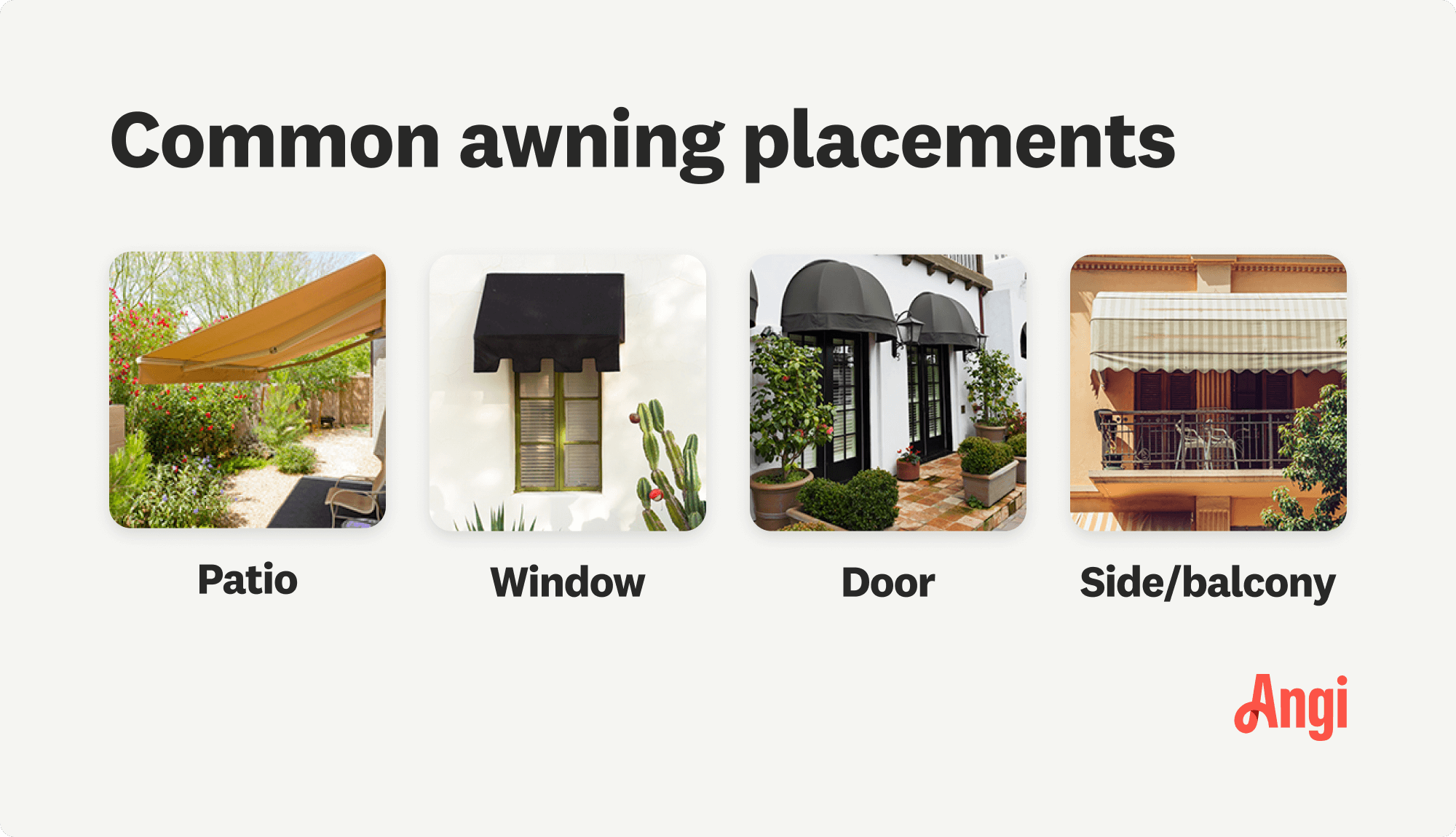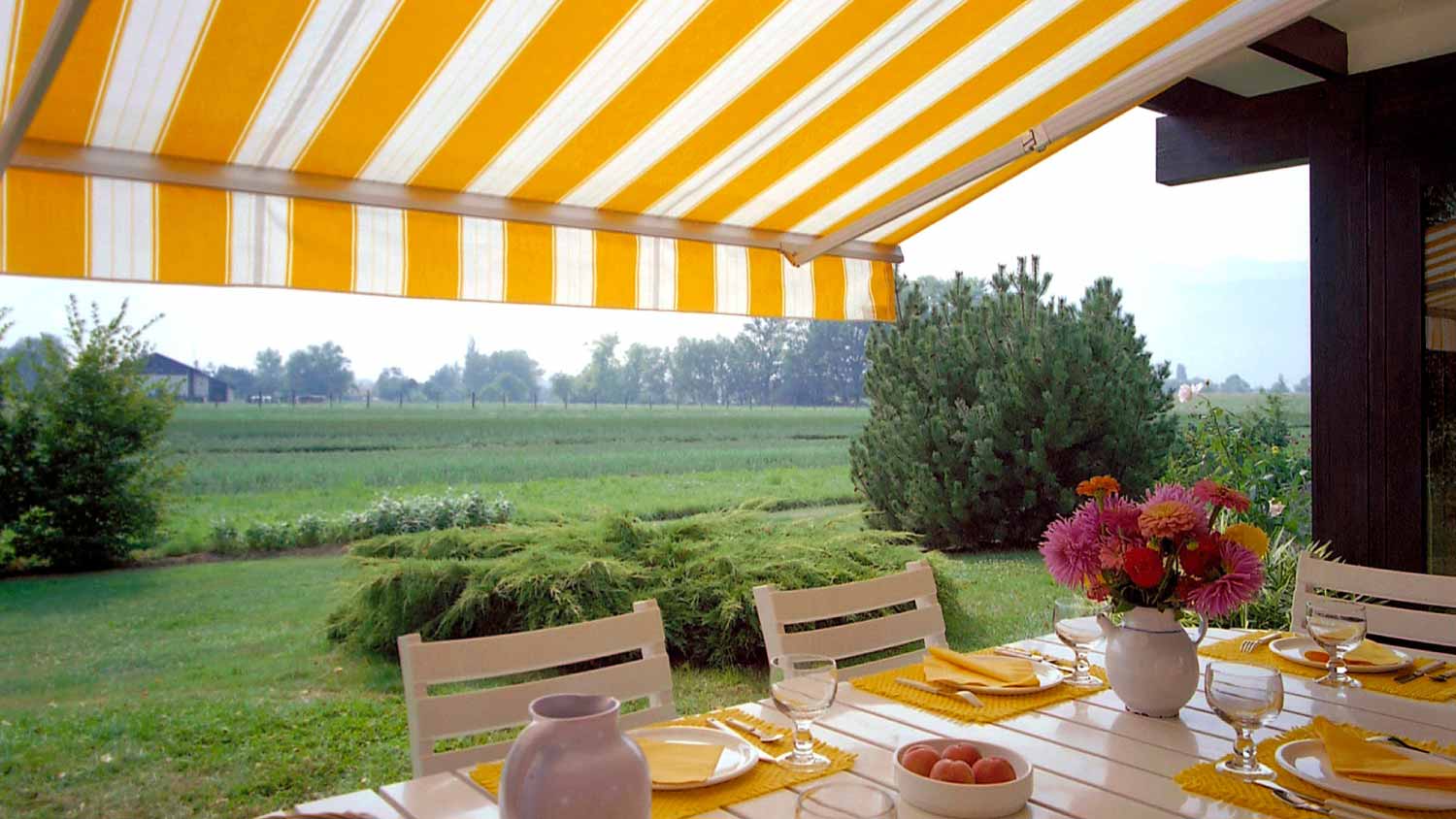
Find out how much retractable awnings cost. Learn about installation, materials, labor, and ways to save on your new retractable awning.
This is one home feature that will leave you in awe(ning)


An awning is a type of shelter that’s attached to a home or building, and it can be fixed or retractable.
There are several common awning types, including window and door awnings, that come in various shapes, such as sloped and domed.
On average, professional awning installation costs $1,400 to $4,500.
Installing an awning over your patio or deck is a great way to extend your home’s entertaining space and start spending more time outdoors. But just what is an awning, and how does it work? Below, learn more about this popular type of covering and decide if it’s right for your home.
An awning is a covering that attaches to the side of a home and extends outward to protect anything underneath it from sun and harsh weather. Awnings are either fixed or retractable and come in a variety of shapes and materials. You'll find them hanging over patios, windows, doors, and balconies on residential (and commercial) properties around the country.
Fixed and retractable awnings also come in a variety of types and shapes. Here’s a quick overview of the most popular options.

Different types of awnings are defined by the area that they cover. The four most common types are:
Patio awnings: These awnings extend over your patio or deck area, sheltering you from the sun’s UV rays and helping you get more use out of your outdoor space. Depending on their material, some patio awnings keep rain out, too.
Window awnings: Located above your windows on the exterior of your house, window awnings roll down to block out the sun and keep your home cooler during summer.
Door awnings: Door awnings hang over your home's entryway, offering coverage for anybody waiting outside your door. They're also quite popular on commercial buildings.
Side awnings: Unlike the other awning types, side awnings open and close vertically. They are often seen on balconies, where they provide an extra layer of shade, privacy, and wind protection.
There are also numerous awning shapes to choose from, including:
Sloped: Sloped awnings have a diagonal slant that runs toward the ground (typically at a 45-degree angle), allowing rain to roll off easily.
Concave: Concave awnings are similar to sloped awnings, except they have a slight inward curve, so they look more like a crescent rather than a sharp line.
Convex: In contrast, convex awnings curve upward and outward before sloping toward the ground.
Domed: With its rounded sides, a domed awning looks like a semi-circle over your door or window. (Technically, it’s a quarter-sphere.)
Flat: Often found over patios, flat awnings run parallel to the ground.
When shopping for an awning, you’ll need to decide if you want one that’s fixed or retractable. Here are the key differences between the two.
Fixed awnings are permanent, stationary fixtures that hang over the side of a home or commercial building. They go over entryways and windows to provide constant refuge from the elements—rather than over patios or decks, which you might want to enjoy covered or uncovered, depending on the weather.
Because they must withstand all kinds of weather conditions, fixed awnings are sturdy, durable, and low maintenance. In most cases, they're made of metal or aluminum. They aren't as versatile as retractable awnings, and after installation, you can't adjust or reposition a fixed awning.
If you have a retractable awning, you can open and close it as you like. For example, on a sweltering day, you might roll out the awning to enjoy the heat without sitting directly in the sun. But if it starts raining later that evening, you could put the awning away so that it doesn't get damaged during the storm.
Retractable awnings are more popular than fixed ones since they offer more flexibility and take up less space when they're not in use. However, retractable awnings are more expensive to buy and repair than fixed awnings, especially if you choose a motorized model rather than one with a manual pulley system. Retractable awnings also have a shorter life span than fixed awnings.
There are more awning materials than you might think, each with its own pros and cons.
Canvas: Canvas awnings are made from cotton, hemp, or linen, though cotton is the most commonly used type of fabric. The cost of canvas awnings can depend on the weight of the fabric; the heavier the fabric, the higher the cost. Heavier, denser canvas is studier and stands up better to the elements. Canvas awnings need varnish applied regularly or they become susceptible to mold, mildew, and rot. In addition, the colors of the material can fade over time with sun exposure.
Vinyl: Vinyl is a durable, long-lasting material that is water—and mildew-resistant. It’s very easy to maintain, though it is more expensive than canvas. In addition, because vinyl is less flexible than other awning materials, it is prone to ripping and, therefore, not ideal in places with high winds.
Acrylic: Acrylic fabric feels like wool, but it is usually made from a blend of materials, sometimes including coal and melted-down petroleum. While light and breathable, acrylic awnings are not entirely waterproof and need regular cleanings.
Metal: While metal awnings used to be popular in the mid-century, they have fallen out of favor as they need frequent repaintings to be rust-resistant. In addition, they dent easily and require more work to clean.
On average, an awning costs between $1,400 and $4,500, including professional installation. However, prices vary based on the awning’s type, size, material, and placement. For example, installing a retractable window awning costs just $250 to $500, whereas adding one over your patio costs up to $3,500.
If you’re on a budget, you could cut costs by handling the installation yourself. Your total savings will depend on the scope of your project and local labor costs, but on average, setting up an awning without professional help will save you between $100 and $400. Depending on where you live, you might also need a permit for the project, which costs $25 to $100 (permit requirements can be confusing, but a pro can handle this part for you).

To install an awning, you’ll need some basic tools, including a ladder, tape measure, and power drill. You’ll also need a friend to help you lift and mount the awning. You can pick up an awning kit—which includes the awning itself and the hardware needed to attach it to your home—at your nearest home improvement store.
However, if your awning is particularly large or technologically advanced, it’s best to consult a local awning installation company. If you install your awning incorrectly, it quickly becomes a safety hazard, and you risk it falling on you, your family, or your guests. Proper installation is the difference between a safely installed awning and one that’s a danger to you and others, so thoroughly consider your skill level before DIYing this one.
After installation, awnings don’t require much ongoing maintenance. Still, there are easy ways to look after your awning so that it lasts as long as possible.
Trim the trees around your awning: Falling branches and leaves can damage or stain your awning, so it’s important to keep any overhanging vegetation trimmed and tidy.
Clean your awning once or twice per year: You can pressure-wash some metal awnings, but you’ll need to be gentler with canvas and fabric models. Check your user guide for detailed care instructions.
In case of damage, contact a professional: Depending on the damage, they might be able to repair—rather than replace—the awning.
From average costs to expert advice, get all the answers you need to get your job done.

Find out how much retractable awnings cost. Learn about installation, materials, labor, and ways to save on your new retractable awning.

Discover awning fabric replacement costs and learn about materials, labor, and additional factors to budget your awning upgrade with confidence.

Discover the true awning installation cost for your home. Learn about average prices, cost factors, and ways to save on your project.

Discover the average awning repair cost, key price factors, and expert tips to help you budget and save on your next awning repair project.

Need an awning that provides shade, comfort, and maybe some privacy from nosy neighbors? Use this guide to find the best awning for your home and lifestyle.

Install an awning like a pro with five simple steps: prep the site, get your numbers right, mark the mourning, install support, and finally, the awning.